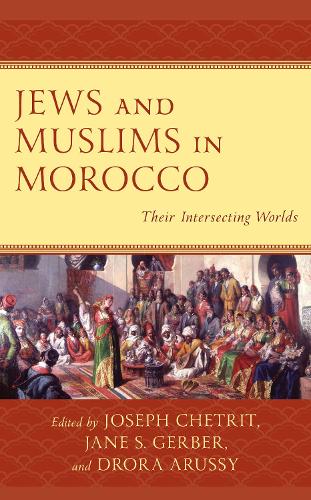
Jews and Muslims in Morocco: Their Intersecting Worlds
(Hardback)
Publishing Details
Jews and Muslims in Morocco: Their Intersecting Worlds
By (Author) Joseph Chetrit
Edited by Jane S. Gerber
Edited by Drora Arussy
Contributions by Jane S. Gerber
Contributions by Daniel J. Schroeter
Contributions by Joseph Chetrit
Contributions by Aomar Boum
Contributions by Jonathan G. Katz
Contributions by Jos Alberto Rodrigues da Silva Tavim
Contributions by Noam Sienna
Bloomsbury Publishing PLC
Lexington Books
27th July 2021
United States
Classifications
Professional and Scholarly
Non Fiction
History of religion
African history
Islam
Social groups: religious groups and communities
305.8924064
Physical Properties
Hardback
506
Width 162mm, Height 236mm, Spine 33mm
857g
Description
Moroccan Jewry has a long tradition, harking back to the areas earliest settlements and possessing deep connections and associations with the historic peoples of the region. In Jews and Muslims of Morocco historians, anthropologists, musicologists, Rabbinic scholars, Arabists, and linguists examine the complex and hybrid history of intercultural exchange between Moroccan Jewry and the Arab and Berber cultures through analyses of the Jews use of Moroccos multiple languages and dialects, characteristic poetry, and musical works as well as their shared magical rites and popular texts and proverbs. The essays in this collection span political and social interactions throughout history, cultural commonalities, traditions, and halakhic developments. Acknowledging that Jewish life in Morocco has dwindled and continues to exist primarily in the memories of Moroccan Jewish diaspora communities, the volume concludes with personal memories an analysis of a visual memoir, and a photo essay of the vanished world of Jewish life in Morocco.
Reviews
Capturing the dialectics and historical vicissitudes of Jewish-Muslim relations in Morocco in all their intricacy and multivocality is a challenging project. This comprehensive volume, which brings together the contributions of 18 leading scholars from a wide gamut of disciplines, faces up to this challenge admirably.
-- Yoram Bilu, Hebrew UniversityThis volume weaves a rich tapestry of Jewish life in Morocco in pre-colonial, colonial, and post-colonial times. Topics include the role played by Jewish exiles from the Iberian Peninsula; Jewish-Muslim relations; and interaction with the French during the Protectorate (19121956). Developments in popular religion, folklore, poetry, music, liturgy, and law make this volume a fascinating introduction to the history and culture of this important and diverse community in the Islamic world.
-- Mark R. Cohen, Princeton UniversityTwo thrusts have enriched the study of North African Jewish communities in recent decades. One is the deepening grasp of how scholarly, mystical, and liturgical developments in other Jewish centers were absorbed, preserved, and cultivated in the Maghreb. Second is the expanding appreciation of how Muslim societyboth as the empowered majority and as quotidian neighborsinterpenetrated Jewish life. Jews and Muslims in Morocco weaves together these perspectives, providing a striking tapestry that both enhances our knowledge and invites continued research.
-- Harvey Goldberg, Hebrew UniversityThis collection of studies by some of the worlds leading scholars from a variety of disciplines offers a wide-ranging peregrination through Moroccan Jewish history and culture and its intricate and complex connection with the surrounding Islamic Arab and Berber cultural matrix. Readers are provided with in-depth, nuanced expositions of social and political interaction between Moroccan Jews and non-Jews and their shared cultural elements of language, literature, music, and popular beliefs and practices. It is a welcome addition to the growing literature on what was once the worlds largest non-Ashkenazi Jewish community with a unique and rich cultural heritage.
-- Noam (Norman) A. Stillman, University of OklahomaAuthor Bio
Drora Arussy is director of the American Sephardi Federation Institute of Jewish Experience.
Joseph Chetrit is professor emeritus of socio-pragmatics, French linguistics, and Judeo-Arabic linguistics at the University of Haifa.
Jane S. Gerber is professor emerita of history and founder and director of the Institute for Sephardic Studies at the Graduate Center of the City University of New York.
